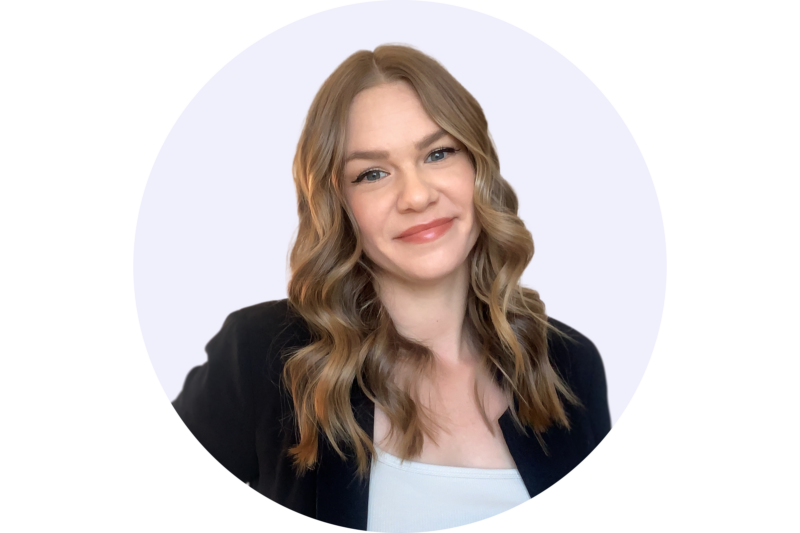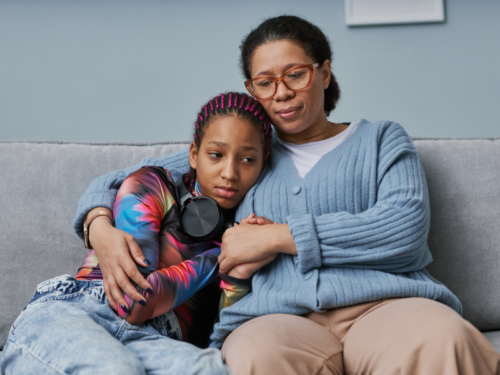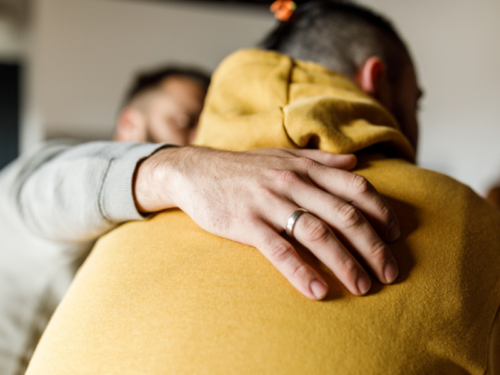
Table of Contents
Yes, Some People Have Depression With Psychotic Features

Written By: Alex Bachert, MPH

Clinically Reviewed By: Sarah Lyter
June 21, 2024
5 min.
Major depression with psychotic features is a severe form of depression that includes symptoms of psychosis, as well as an increased risk of suicide and self-harm. Learn how to get help today.
Learn more about our Clinical Review Process
Table of Contents
Depression with psychotic features is a severe form of major depressive disorder (MDD) that includes psychotic symptoms, such as delusions, hallucinations, and psychomotor impairment. The condition typically falls into one of two categories: MDD with mood-congruent psychotic features (meaning depressive symptoms) or MDD with mood-incongruent psychotic features (meaning absence of depressive symptoms). Below, we’ll delve into how depression with psychotic features manifests, as well as how the condition is diagnosed and treated.

Personalized treatment for severe depression
Virtual intensive therapy for teens, adolescents, and families.
What is depression with psychotic features?
In essence, depression with psychotic features is a form of clinical depression that includes psychotic symptoms. Someone with MDD with mood-congruent psychotic features usually experiences delusions and hallucinations that align with typical symptoms of depression. For example, they might hear voices saying, “You are worthless,” or suffer from delusions related to guilt, illness, or death. By contrast, in MDD with mood-incongruent psychotic features, someone’s delusions and hallucinations may not reflect the thoughts and feelings we typically associate with depression. For example, someone may experience paranoid delusions or delusions of grandeur, such as believing they’re someone famous or that they have special powers.
Like most mental health conditions, depression with psychotic features is caused by a combination of genetic, biological, psychological, and environmental factors. Data shows that the prevalence of MDD with psychotic features increases with age, and patients with psychotic features are more likely to have treatment-resistant depression than those without psychotic symptoms.
According to Tracye Freeman Valentine, LPC-MHSP, a Charlie Health Clinical Supervisor, MDD with psychotic features can lead to complications such as problems at work or school, withdrawal from usual activities, self-harm, and even suicide. For example, a person may experience “command hallucinations with voices or images that may direct a client to complete an unsafe activity such as suicide or harming others,” she says. If you’re experiencing suicidal thoughts or are in danger of harming yourself, this is a mental health emergency. Contact The Suicide & Crisis Lifeline 24/7 by calling or texting 988.
How common is depression with psychotic features?
Data suggest that 20% of U.S. adolescents ages 12 to 17 years have experienced at least one major depressive episode, with approximately 15% of those youth reporting that the experience was severe enough to affect their daily functioning. While there is clear data on the prevalence of MDD, less is known about just how common it is to experience MDD with psychosis. Some estimates suggest that MDD with psychosis affects 10-19% of people with major depression, but another study found that the condition was misdiagnosed in 27% of cases.
How is depression with psychotic features different from traditional depression?
The primary difference between depression with psychotic features and a traditional MDD diagnosis is the presence of psychotic symptoms. Here are some of the general signs of depression and psychosis, according to Valentine.
Depression
- Anhedonia (lack of interest and pleasure in activities)
- Hopelessness
- Restlessness
- Feelings of worthlessness
- Fatigue
- Irritability
- Changes in weight or appetite
- Thoughts of death
- Difficulty concentrating
- Isolation
- Disinterest in personal grooming
Psychosis
- Strange and new feelings or void of feelings
- Delusions (false beliefs or misinterpretations)
- Hallucinations (false perceptions usually involving the senses)
- Disorganized behavior (inability to think logically)
- Catatonia (abnormal movements, behavior, or withdrawal)

How is depression with psychotic features diagnosed?
Depression with psychotic features is diagnosed by a qualified mental health professional following a thorough evaluation. This typically includes a physical exam, psychological assessment, and discussion of individual and family health history. Often, the evaluation will also include bloodwork to help rule out physiological or neurological issues that may mimic MDD with psychotic features. Depression with psychotic features does not have its own criteria in the Diagnostic and Statistical Manual of Mental Disorders (DSM-5) but is classified under major depressive disorder (MDD) with a specifier for psychotic features.
How to manage depression with psychotic features
When it’s established that someone has depression with psychosis, it’s essential to connect them with appropriate and timely care. A leading consideration when treating MDD with psychotic features is “ensuring the prevention of major depression recurrence/relapse as this ‘opens the door’ to the associated psychotic features,” explains Rebecca Holland, PMHNP-BC, a Psychiatric Nurse Practitioner with Charlie Health.
Timely access to care is also “necessary for the safety of the person experiencing MDD with psychosis and safety of others exposed to the person experiencing the psychotic depression symptoms and diagnosis,” adds Valentine. Below, we review some of the most effective forms of treatment for MDD with psychotic features.
1. Medication management
Antidepressants and antipsychotics are often used to manage MDD with psychotic features, but the exact medication, dose, and frequency depend on each person’s needs and symptoms. For example, someone might require antipsychotic medications to manage acute psychotic depression symptoms. But when the psychosis is stabilized, their depression may be controlled with daily antidepressant medication, explains Holland.
2. Patient and family education
“When considering risks and complications of MDD with psychotic features, it is very important to ensure patients and their natural supports are well informed of the diagnosis and consider the risks vs benefits of long-term antipsychotic therapy,” says Holland. While antipsychotics can cause side effects, they may be the best option for people who frequently relapse with psychotic symptoms because the medication will allow them to maintain their level of functioning in daily life, she explains. Valentine agrees with the idea of patient education, adding that “no one treatment modality is right for all, and client and family psychoeducation is key.”
3. Brain stimulation therapies
“Psychopharmacotherapy is the most used treatment, but electroconvulsive therapy (ECT) for depressive disorder with psychosis or repetitive transcranial magnetic stimulation (rTMS) for severe depression are also options,” explains Valentine.
ECT uses electrical stimulation to the brain to help treat depression that’s not responding to other treatments. People typically receive ECT 2-3 times per week for a total of 6-12 treatments, and it’s been shown to lead to substantial improvement in approximately 80% of people with severe major depression. A less invasive option is rTMS, which places magnetic fields against a person’s scalp to stimulate nerve cells in the brain to improve mood and other symptoms of major depression.
4. Talk therapy
When combined with medication, talk therapy can help people with depression and psychosis identify harmful thought patterns and behaviors, address depressive and psychotic symptoms, and find healthier ways of coping with distressing emotions. Some people may benefit from trying family therapy in order to support a loved one who is learning to manage symptoms of psychosis.

Treating clinical depression and psychosis with Charlie Health
If you or a loved one are struggling with major depressive disorder (MDD) with psychotic features, Charlie Health’s team of trained mental health professionals is here to help. Charlie Health’s virtual Intensive Outpatient Program (IOP) provides more than once-weekly mental health treatment for young people and families dealing with serious mental health disorders, including major depression, bipolar disorder, and other mood disorders. Our expert clinicians incorporate evidence-based therapies into individual therapy, family therapy, and peer support groups to make managing your mental health possible. Fill out the form below or give us a call to start healing today.




